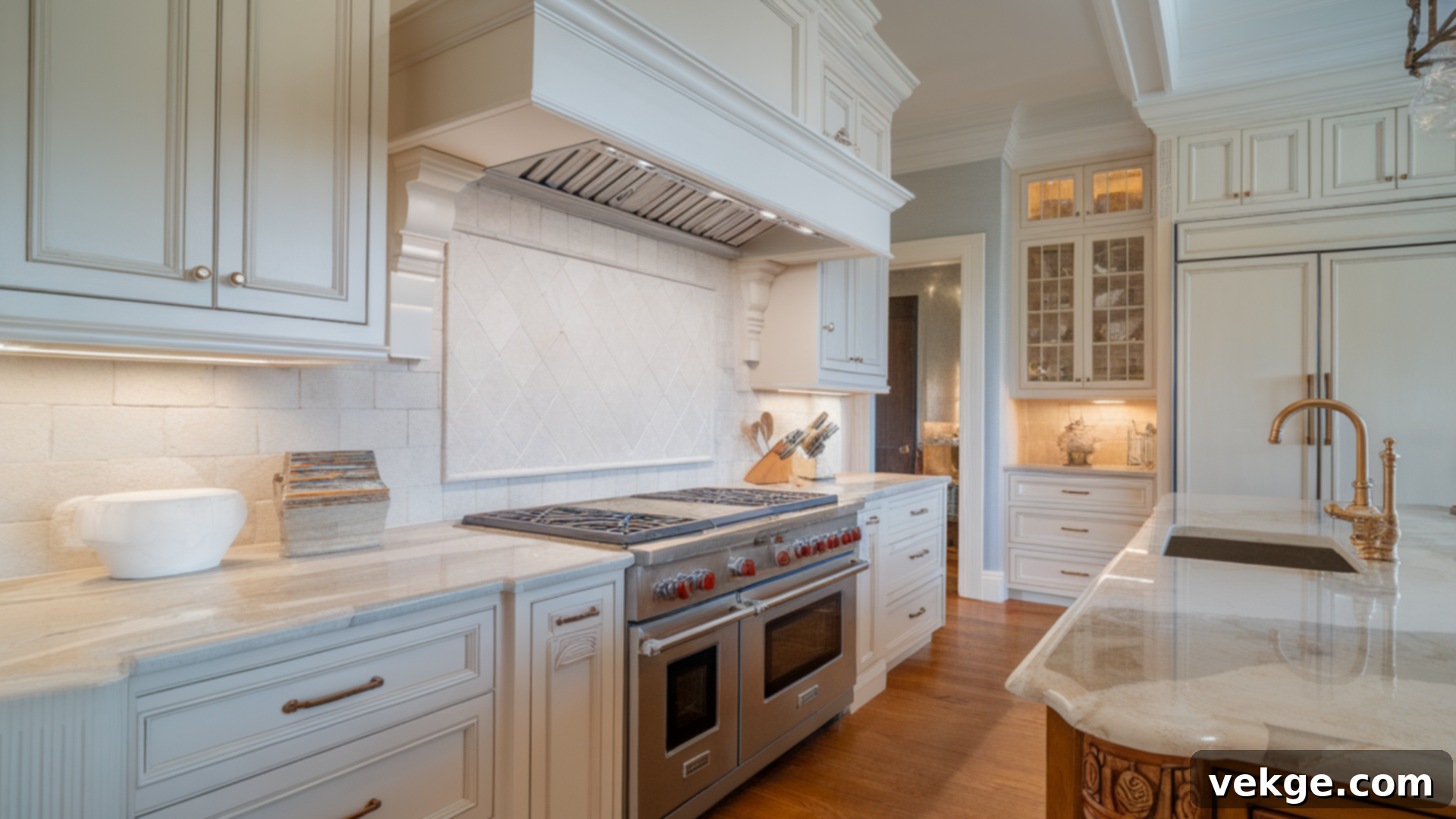Ultimate Guide to Choosing the Best Countertop Materials for Your Kitchen & Bathroom
Choosing new countertops for your kitchen or bathroom is a significant decision that impacts both the aesthetics and functionality of your space. With a dazzling array of options available, from the timeless elegance of natural stone to the modern versatility of engineered materials and budget-friendly alternatives, it’s easy to feel overwhelmed. You’re not just selecting a surface; you’re investing in a central feature that will endure daily use, spills, and heat for many years to come.
Before diving into the vast world of countertop materials, it’s crucial to consider several key factors. Your budget, desired level of maintenance, overall design vision, and the importance of durability will all play a vital role in guiding your choice. A truly great countertop looks stunning, seamlessly integrates with your home’s style, and stands up to the demands of your lifestyle.
This comprehensive guide is designed to simplify your decision-making process. We’ll explore various countertop materials in detail, highlighting their unique characteristics, benefits, and potential drawbacks. By the end, you’ll possess the knowledge to confidently select the material that perfectly complements your space, meets your practical needs, and reflects your personal taste. Let’s embark on this journey to find your ideal countertops!
Essential Factors to Consider When Selecting Countertop Materials
Selecting the right countertop goes far beyond mere aesthetics; it’s about finding a material that truly suits your daily life and how you use your kitchen or bathroom. Before you commit to a specific option, carefully evaluate these critical considerations:
Cost: Countertop material prices span a wide spectrum, from highly economical choices like laminate to premium selections such as granite, marble, or quartzite. While natural stones and engineered quartz typically represent a higher upfront investment, they often offer superior longevity and resale value. More budget-friendly options like laminate and polyester can be excellent choices for those working within tighter financial constraints, offering attractive finishes without breaking the bank. Remember to factor in not just the material cost per square foot, but also fabrication, delivery, and installation fees, which can vary significantly.
Durability: How much wear and tear will your countertops face? Materials like granite and quartz are renowned for their exceptional durability, boasting impressive resistance to scratches, heat, and stains, making them ideal for busy households. In contrast, softer materials such as butcher block or some laminates are more susceptible to damage and may require a gentler approach to daily use. Consider whether your countertop needs to withstand hot pans, sharp knives, or frequent spills, as this will heavily influence your durability requirements.
Maintenance: Your willingness to invest time in maintaining your countertops is a crucial factor. For homeowners seeking minimal upkeep, non-porous materials like quartz and solid surface (Corian) are fantastic choices, requiring little more than a wipe-down. Natural stones, including marble and granite, while beautiful, demand more attention, typically needing periodic sealing to prevent staining and maintain their lustrous finish. Wood countertops also require regular oiling or sealing to protect against moisture and enhance their lifespan.
Design Appeal and Aesthetics: Countertops play a pivotal role in defining the style of your kitchen or bathroom. Natural stones like marble exude timeless luxury and sophistication, often becoming a stunning focal point. Butcher block introduces a warm, organic, and rustic charm, while engineered quartz can provide a sleek, clean, and ultra-modern look with its consistent patterns and vast color palette. Think about the overall ambiance you wish to create – traditional, contemporary, industrial, or farmhouse – and how the material’s texture, color, and pattern contribute to that vision.
Resale Value: While not the primary concern for everyone, considering how your countertop choice might affect your home’s resale value can be beneficial. High-quality, durable materials like natural stone and quartz are often seen as desirable upgrades by prospective buyers, potentially increasing your home’s market appeal and value. Cheaper alternatives, while functional, might not offer the same return on investment.
By thoughtfully addressing these points, you’ll be well-equipped to choose a countertop material that not only enhances the beauty of your home but also performs flawlessly for your everyday needs and investment expectations.
Exploring Diverse Countertop Materials for Every Home
Finding the perfect countertops for your kitchen or bathroom involves a careful selection of materials that harmoniously blend aesthetics, functionality, and longevity. The right choice will not only elevate your home’s design but also simplify your daily routine. Below, we delve into a wide array of options, categorized for easier comparison, to help you discover the ideal fit for your space and culinary habits.
Natural Stones: Timeless Elegance and Unmatched Durability
Natural stone countertops have graced kitchens and bathrooms for centuries, celebrated for their inherent beauty, exceptional durability, and unique character. Each slab is a geological masterpiece, ensuring that no two installations are ever precisely alike. Their natural variations in color, veining, and pattern add an unparalleled level of sophistication and depth to any design. Here’s a closer look at some of the most sought-after natural stone options:
1. Granite
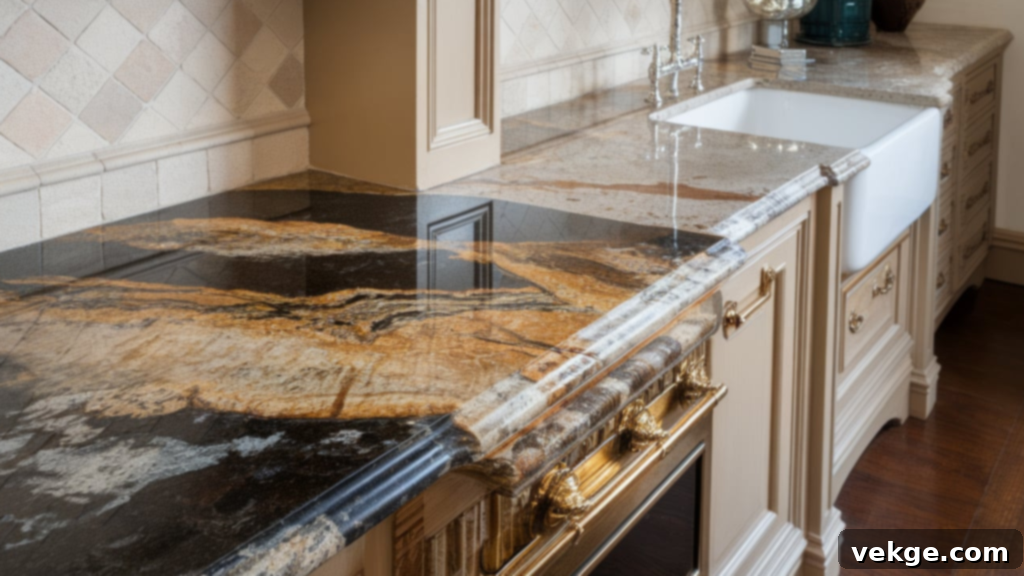
Granite is perhaps the most well-known and widely used natural stone for countertops, revered for its incredible toughness, resistance to heat, and long-lasting beauty. Formed from cooled magma, it’s an igneous rock composed of quartz, feldspar, and mica, giving it its characteristic speckled or veined appearance. This makes granite an exceptionally durable countertop material, perfectly suited for high-traffic kitchens and bathrooms where it can effortlessly withstand heavy daily usage, accidental spills, and even hot pots directly from the stove. Available in a vast spectrum of colors—from deep blacks and grays to vibrant reds, blues, and earthy tones—and an endless array of unique patterns, granite ensures that every kitchen or bathroom receives a truly personalized and distinctive touch. While naturally porous, proper sealing upon installation and every 1-3 years afterward ensures its resistance to stains.
2. Marble
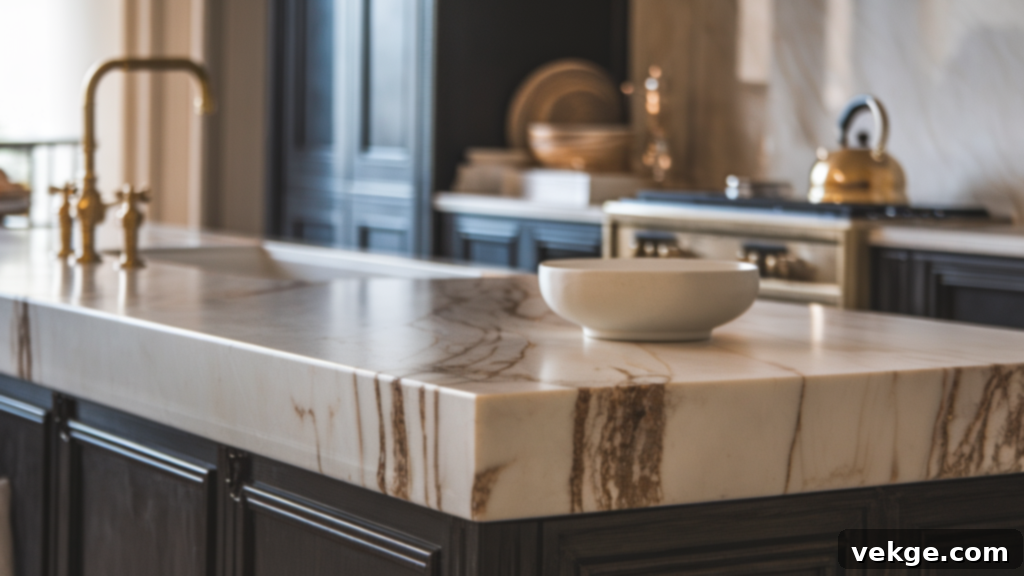
Marble countertops are synonymous with timeless luxury and sophistication, making them a perennially popular choice in high-end, classic kitchen and bathroom designs. Its characteristic soft, elegant veining and often light, bright appearance create an undeniable sense of grandeur. While exquisitely beautiful, marble is a metamorphic rock that is softer than granite and more susceptible to etching from acidic liquids (like lemon juice or vinegar) and can stain more easily if not properly sealed. It demands a bit more care and attention, requiring regular sealing to maintain its pristine appearance and ensure its longevity. Despite its delicate nature, many homeowners embrace marble’s tendency to develop a unique patina over time, viewing it as a testament to a well-loved and lived-in space. Its cool surface is also a favorite among bakers.
3. Soapstone
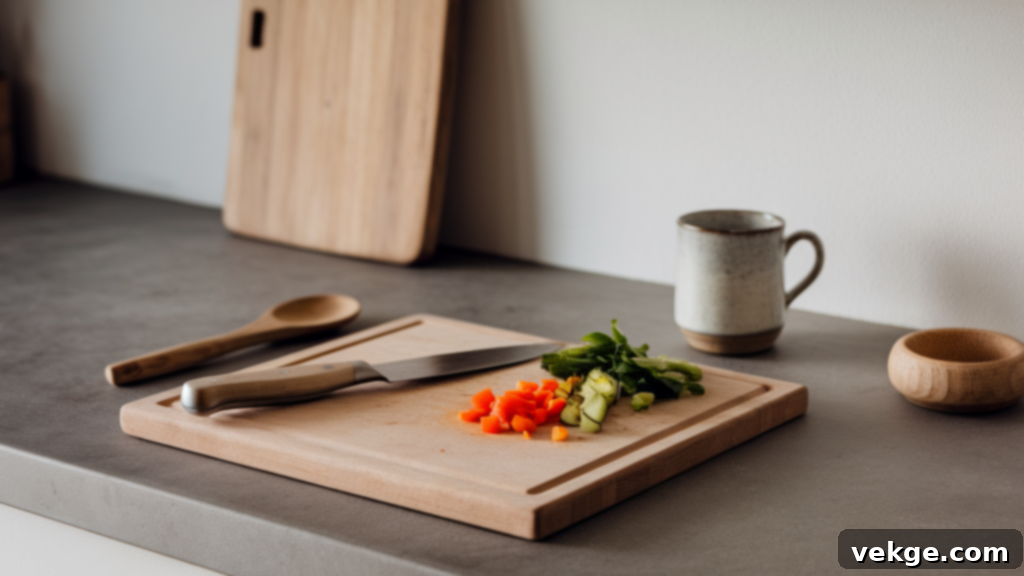
Soapstone, though less common than granite or marble, offers a distinctly beautiful and tactile experience. Known for its incredibly smooth, almost soapy feel, and a sophisticated matte finish, this natural stone is primarily composed of talc. It boasts inherent resistance to heat and is remarkably non-porous, meaning it never requires sealing – a significant advantage over many other natural stones. Soapstone naturally darkens and develops a unique, rich patina over time, which many homeowners find adds to its charm and character. While it is softer than granite, making it somewhat prone to scratches, these imperfections are often shallow and can be easily repaired by simply sanding the surface or applying mineral oil to blend them away, contributing to its “living finish” appeal. Its classic, understated elegance makes it a favorite for traditional and farmhouse-style kitchens.
4. Quartzite
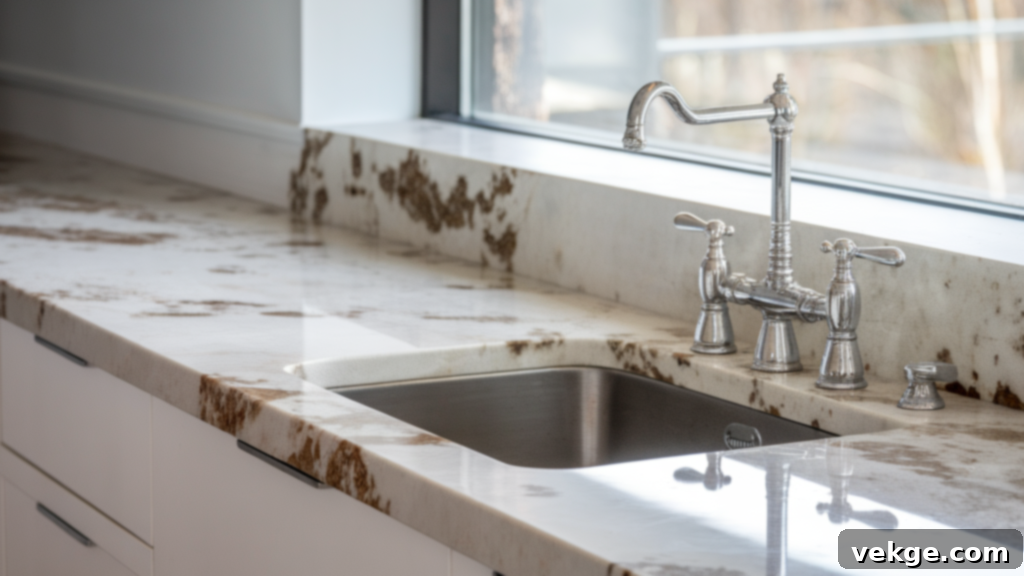
Often confused with engineered quartz, natural quartzite is a distinct and highly desirable stone formed from sandstone under intense heat and pressure. It stands out for its remarkable hardness and density, closely rivaling granite in terms of durability. Many varieties of quartzite exquisitely mimic the luxurious look of marble, featuring delicate veining and often brighter white or gray tones, but without marble’s susceptibility to etching. This unique combination offers the aesthetic appeal of natural stone with the robust performance of granite, making it a fantastic choice for those who love the marble look but desire greater resilience. Like marble, quartzite is somewhat porous and typically requires sealing to prevent stains, though it offers impressive heat resistance and superior scratch durability compared to its softer counterpart. It’s an excellent investment for a stunning and long-lasting countertop.
Engineered Stones: Modern Performance Meets Design Flexibility
Engineered stones are innovative countertop materials created by combining natural stone particles (like quartz or marble dust) with high-performance resins and pigments. This manufacturing process results in surfaces that often surpass natural stones in terms of durability, consistency, and ease of maintenance, while offering incredible design versatility. They are a popular choice for contemporary homes and busy families. Here are some prominent engineered stone options:
5. Quartz
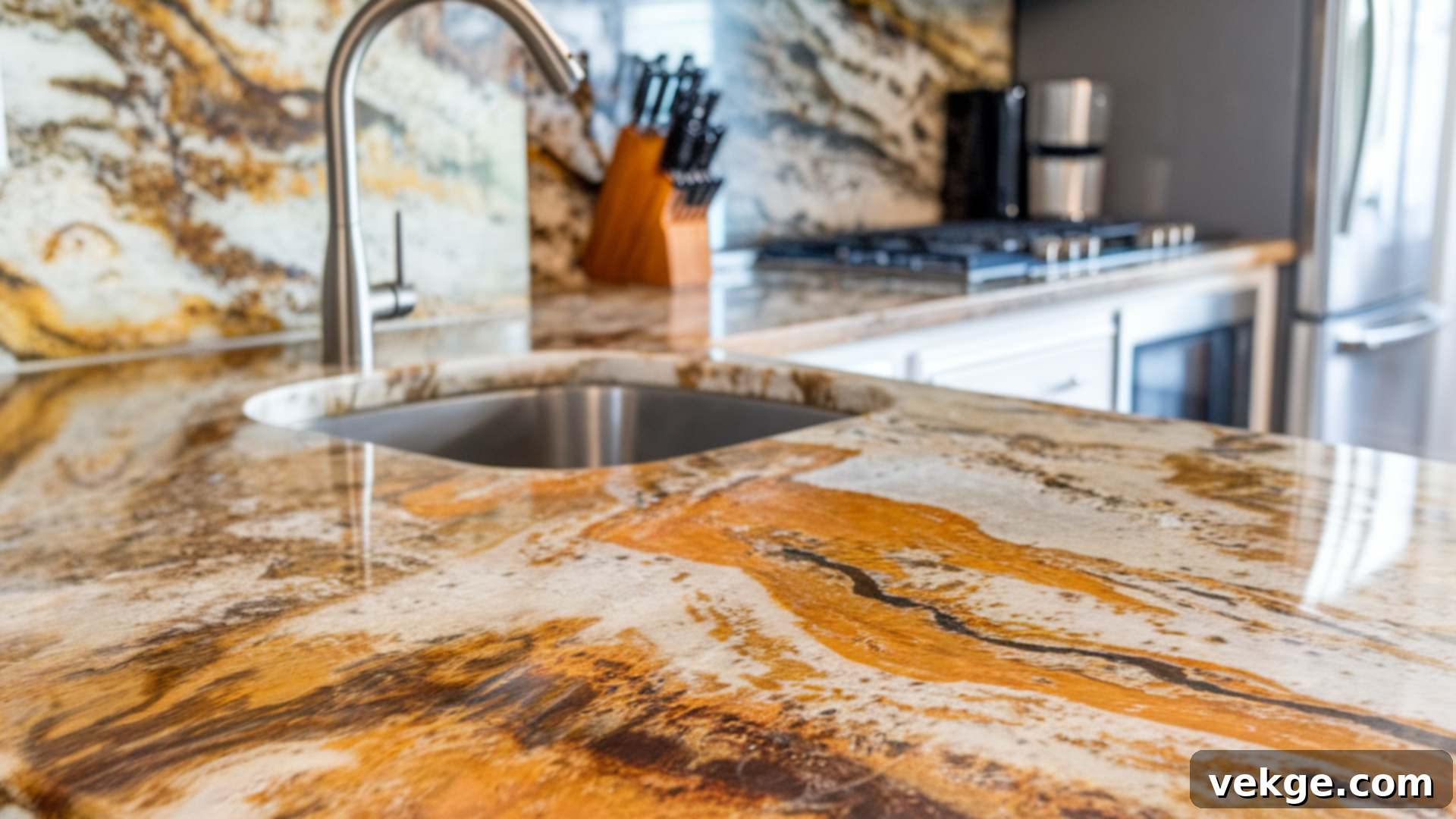
Engineered quartz countertops are a leading choice for modern kitchens and bathrooms, composed of approximately 90-95% ground natural quartz crystals combined with polymeric resins and pigments. This composition makes quartz incredibly hard, exceptionally durable, and, crucially, non-porous. Unlike natural stones, quartz never requires sealing, making it one of the lowest-maintenance options available. It is highly resistant to scratches, stains, and impacts, ideal for high-activity areas. The manufacturing process allows for a vast and consistent range of colors, patterns, and finishes, from solid hues and subtle flecks to intricate designs that convincingly mimic natural marble or granite, fitting virtually any visual aesthetic. However, excessive heat can damage the resin, so trivets are recommended.
6. Concrete
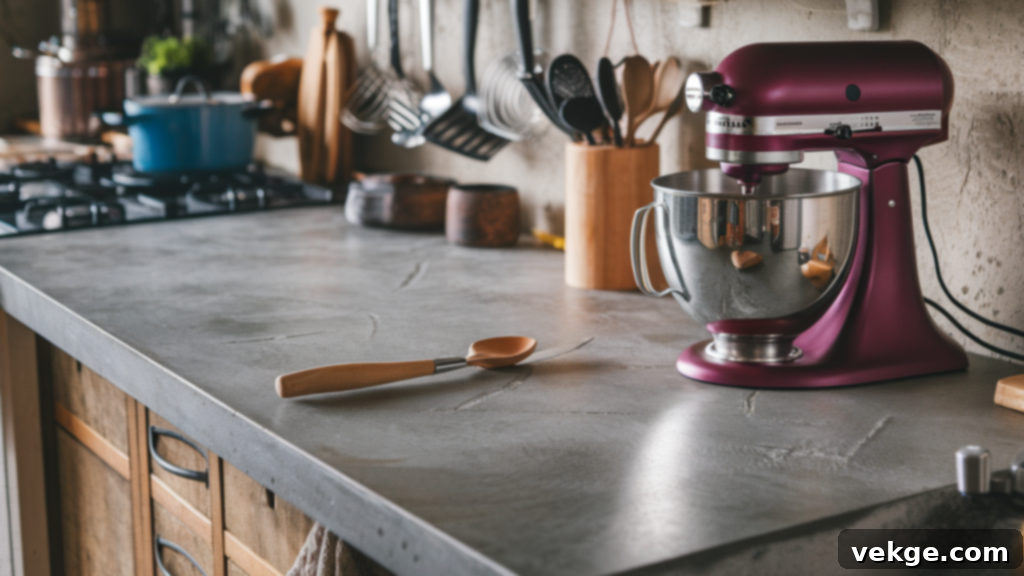
Concrete countertops offer unmatched customization and a distinct, modern industrial aesthetic. They can be custom-poured to fit any precise shape, size, or design requirement, allowing for integrated sinks, unique textures, and a virtually unlimited palette of colors through added pigments. This bespoke nature makes them a truly unique option for personalized spaces. However, concrete is inherently porous and requires regular sealing to prevent staining and water absorption. While durable, it can be prone to cracking if not properly installed and maintained, especially during temperature fluctuations or settlement. Despite these considerations, the ability to create a truly one-of-a-kind surface with a robust, earthy feel makes concrete a compelling choice for architectural and contemporary designs.
7. Corian (Solid Surface)
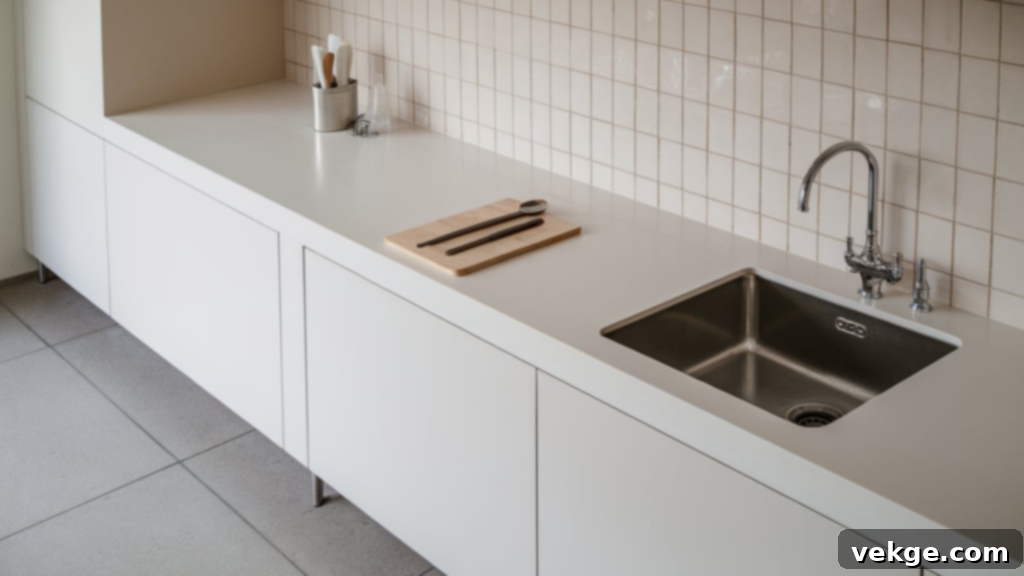
Solid surface countertops, widely known by the brand name Corian (a product of DuPont), are synthetic materials primarily made from acrylic or polyester resins and mineral fillers. One of their most significant advantages is the ability to create truly seamless installations, including integrated sinks, which eliminates crevices where dirt and grime can accumulate, making them exceptionally hygienic and easy to clean. Available in a vast spectrum of colors, patterns, and textures, solid surfaces offer extensive design flexibility, from vibrant solids to subtle stone-like appearances. However, solid surfaces are softer than natural stones or engineered quartz, meaning they can be more prone to scratches, dents, or heat damage from hot pans. The good news is that minor damage can often be buffed out or repaired by a professional, restoring the surface to its original condition. They are a great choice for those prioritizing hygiene, seamless design, and repairability.
Wood and Other Organic Materials: Warmth, Character, and Sustainability
For those seeking to infuse warmth, natural texture, and an inviting ambiance into their kitchen or bathroom, wood-based and organic countertops are an excellent choice. They bring a unique character that evolves beautifully over time, often used as an accent or in combination with other materials to create compelling contrasts. These materials often appeal to eco-conscious homeowners. Here are some popular wood and organic options:
8. Butcher Block
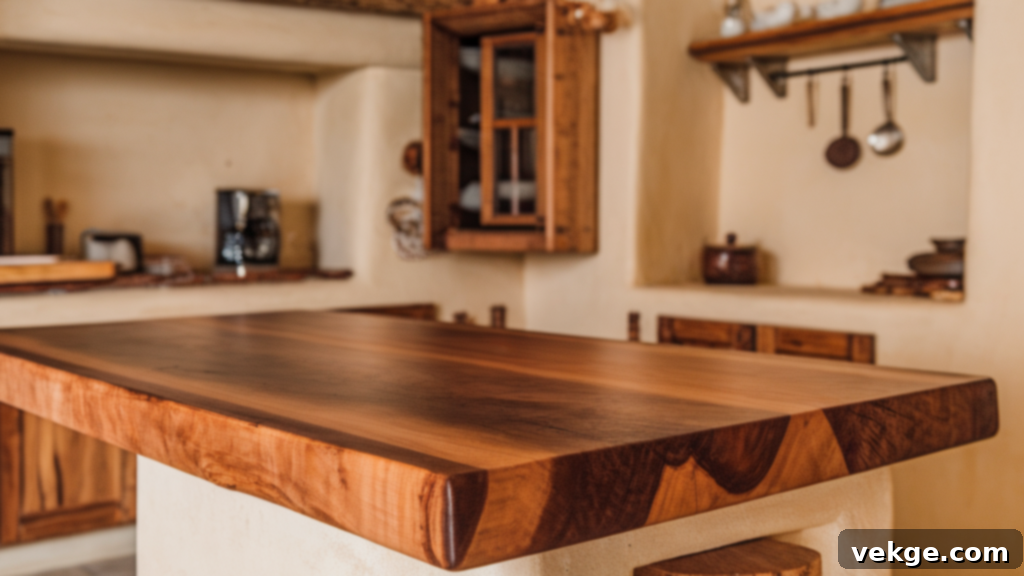
Butcher block countertops are crafted from thick strips of solid wood, typically maple, oak, cherry, or walnut, glued together to form a robust and appealing surface. These counters are highly prized for their rustic charm, natural warmth, and inviting texture, making them a focal point in farmhouse, traditional, and transitional kitchens. Beyond aesthetics, butcher block is incredibly functional, especially in kitchens where food preparation is frequent, as it can be used directly as a cutting surface (with proper food-safe oiling and maintenance). While durable against impacts, wood is susceptible to water damage, scratches, and stains, requiring regular oiling or sealing to maintain its integrity, prevent drying, and enhance its water resistance. With proper care, butcher block can last for decades and develop a beautiful, rich patina.
9. Bamboo
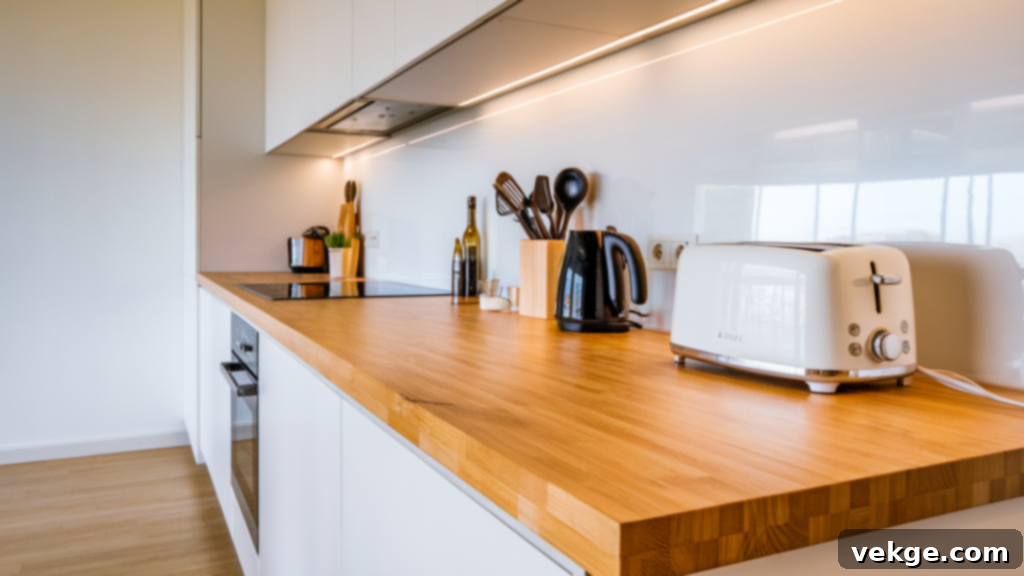
Bamboo offers a compelling, sustainable, and eco-friendly alternative for countertops. As a grass, it grows rapidly and can be harvested without destroying the plant, making it an incredibly renewable resource. When engineered into countertop slabs, bamboo is surprisingly hard and durable, often surpassing some traditional hardwoods in strength and stability. Its distinctive grain pattern provides a naturally elegant and contemporary look. Additionally, bamboo possesses natural antibacterial properties, contributing to a hygienic kitchen environment. However, like other wood-based options, bamboo countertops can be prone to scratching and are not as heat-resistant as stone materials. They require diligent sealing and regular oiling to protect against moisture and maintain their beauty, but they offer a beautiful, conscience-friendly choice for modern and natural designs.
Metal and Other Specialty Materials: Industrial Chic and Unique Textures
For homeowners looking to make a bold statement or achieve a specific design aesthetic, metal and other specialty countertops provide unique and striking options. These materials often lend themselves to modern, industrial, or highly personalized spaces, offering durability and distinctive visual appeal that sets them apart from more traditional choices. Here’s a look at some popular metal and specialty countertop materials:
10. Stainless Steel
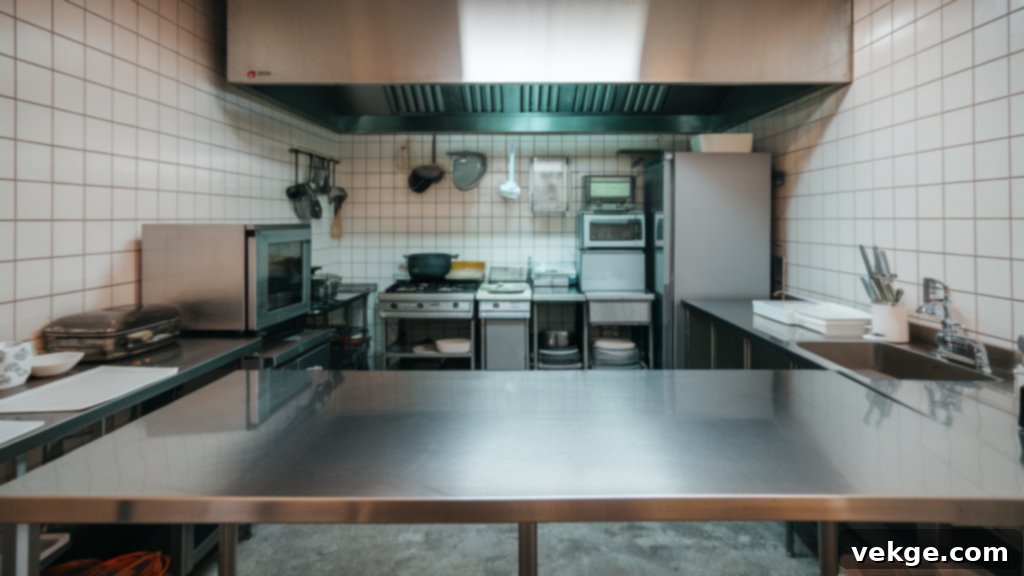
Popular in commercial kitchens for its unparalleled hygiene and resilience, stainless steel brings a sleek, professional, and distinctly industrial look to residential spaces. It is highly durable, inherently non-porous (making it incredibly sanitary), and exceptionally heat-resistant, capable of withstanding hot pots and pans without damage. Stainless steel is also very easy to clean and maintain, resisting most stains. However, it requires professional fabrication and installation to achieve seamless results, which can contribute to a higher cost. It’s prone to showing fingerprints and scratches, though these minor imperfections often blend into a unique patina over time, which some homeowners appreciate as part of its industrial charm. Its reflective surface can also make a kitchen feel brighter and more expansive.
11. Copper
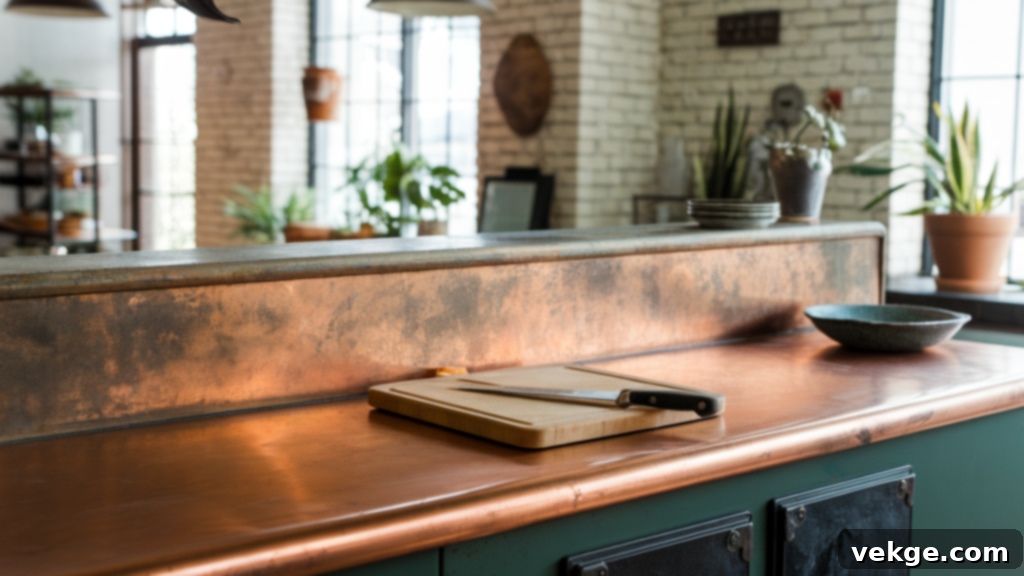
Copper countertops offer a distinctive blend of rustic warmth and sophisticated elegance, making a striking visual impact. Renowned for its natural antimicrobial properties, copper is an exceptionally hygienic surface, actively killing bacteria and viruses. It’s also relatively easy to clean with mild soap and water. However, copper is a relatively soft metal and is prone to scratches, dents, and the development of a unique patina over time, as it reacts with air and acidic substances. This evolving finish, ranging from warm browns to verdigris greens, is highly prized by those who appreciate its “living material” quality, but it means the surface will not retain a uniform shine. Proper sealing can slow down the patination process, but it cannot stop it entirely. Its unique character makes it a truly special choice for a kitchen or bar area.
12. Zinc
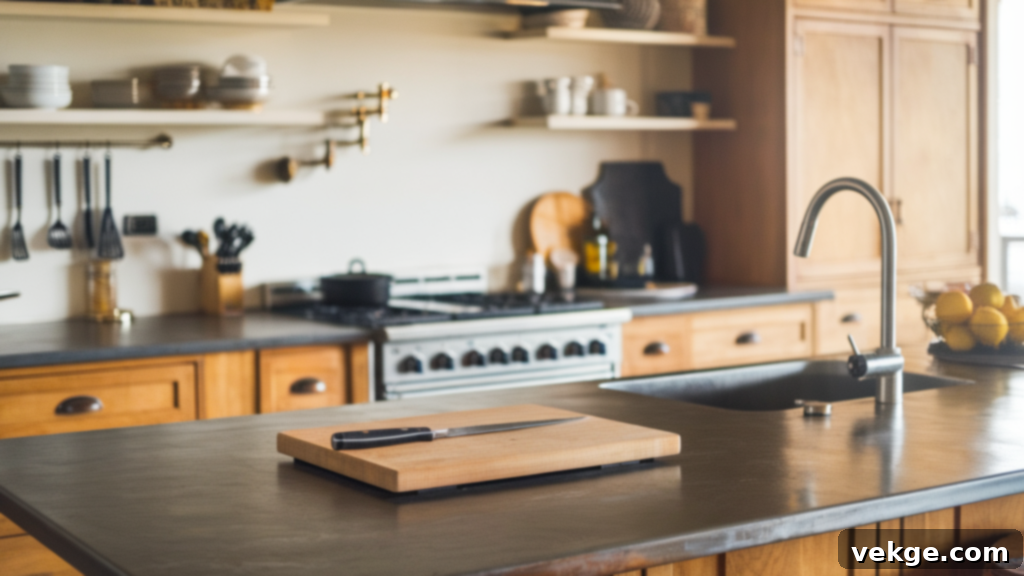
Zinc countertops are celebrated for their distinctive matte finish, soft metallic luster, and remarkable antibacterial properties, similar to copper. As a “living” material, zinc develops a beautiful, ever-changing patina over time, ranging from a steely blue-gray to a dark, rich charcoal, adding character and depth to any space. While aesthetically unique and durable in terms of longevity, zinc is a relatively soft metal that scratches easily and is not highly heat-resistant, requiring careful use of cutting boards and trivets. Minor scratches tend to blend into the patina over time, contributing to its aged look. Zinc is particularly popular in French bistro-style kitchens, bar areas, or for those aiming for an understated industrial or rustic-chic appeal. Professional installation is generally recommended due to its specific fabrication requirements.
13. River Rock

River rock countertops offer an incredibly unique and visually striking surface, bringing the serene beauty of nature indoors. They are created by meticulously embedding smooth, polished river stones into a durable resin or cement base, resulting in a textural, earthy, and organic appearance. Each installation is a custom work of art, with the arrangement and colors of the stones creating a one-of-a-kind pattern. While offering a highly distinctive aesthetic, these countertops require diligent maintenance to prevent staining, as the grout lines or resin matrix can be porous. Regular sealing is essential to protect the surface and keep it looking its best. They are a bold choice for feature areas, outdoor kitchens, or bathrooms where a strong natural statement is desired, adding a spa-like or rustic cabin feel.
Alternative Surface Options: Budget-Friendly and Versatile Solutions
If your priority is finding attractive, functional countertops within a more conservative budget, without necessarily compromising on style, these alternative materials are excellent choices. While they may not always match the extreme durability or longevity of natural stones, they offer a wide array of design possibilities at a significantly lower price point, making them accessible to a broader range of homeowners.
14. Laminate
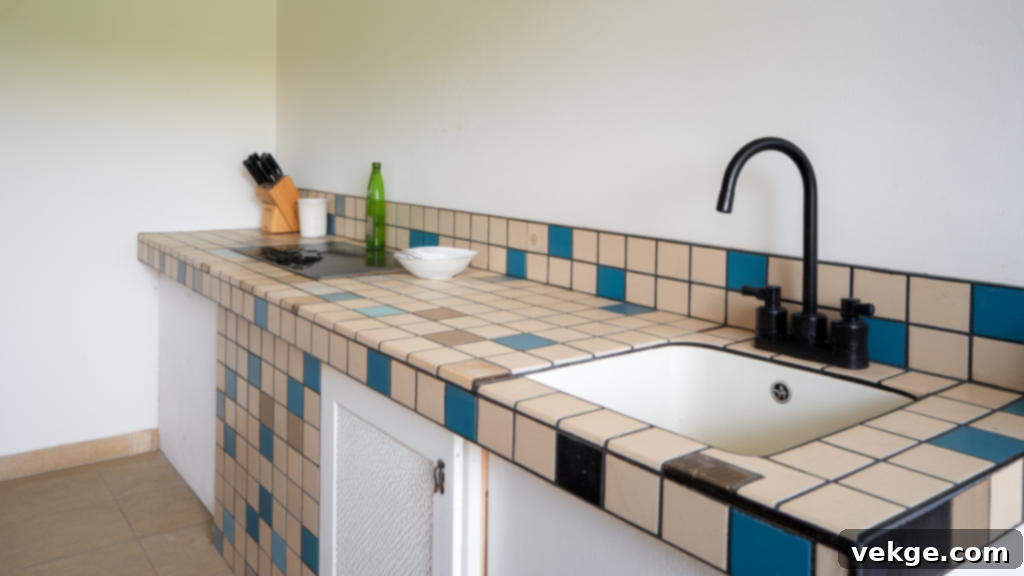
Laminate countertops remain one of the most budget-friendly and accessible options on the market. Constructed from layers of plastic laminate bonded to a particleboard or plywood core, they offer an astonishing variety of colors, patterns, and textures, including highly convincing imitations of natural stone, wood, and even concrete. Laminate is exceptionally easy to install, often making it a popular DIY choice, and requires minimal cleaning. However, it is prone to scratches, chipping, and is not heat-resistant, meaning hot pans can easily damage the surface. While a damaged laminate countertop cannot be easily repaired and typically requires full replacement, its affordability and vast design choices make it an excellent solution for temporary kitchens, rental properties, or homeowners on a strict budget who still desire an updated look.
15. Paper Composite
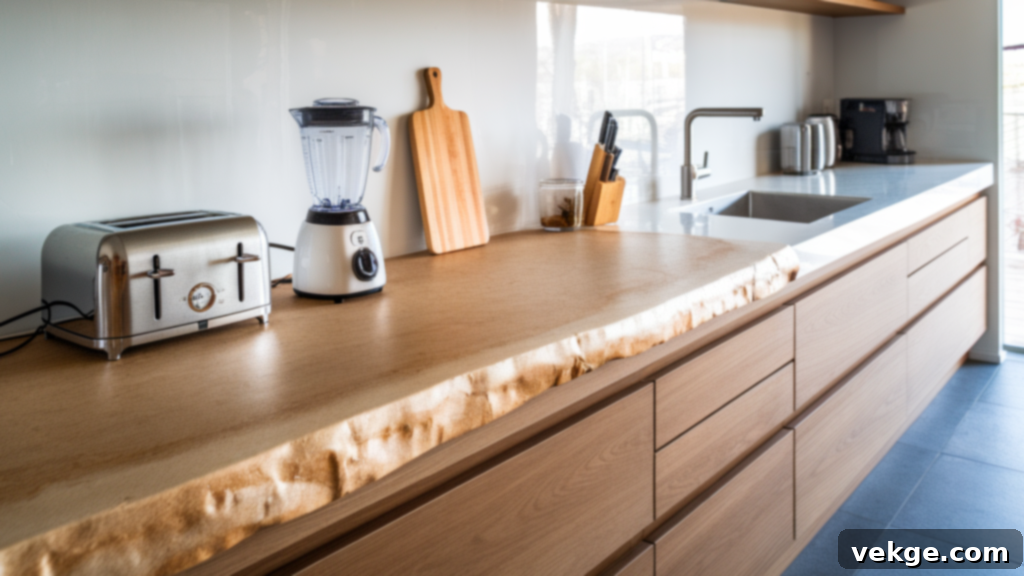
Paper composite countertops represent an innovative and eco-friendly option, crafted from recycled paper fibers saturated with a phenolic resin and then compressed under intense heat and pressure. The result is a dense, hard, and surprisingly durable surface that often resembles dark soapstone or a smooth, matte wood. They are naturally resistant to heat and generally offer good scratch resistance, making them a practical choice for many kitchens. While they are more expensive than laminate, their environmental credentials, unique aesthetic, and solid performance appeal to those seeking sustainable building materials. Their availability can be more limited compared to mainstream options, and they typically require occasional oiling or sealing to maintain their finish and moisture resistance, similar to wood.
16. Polyester
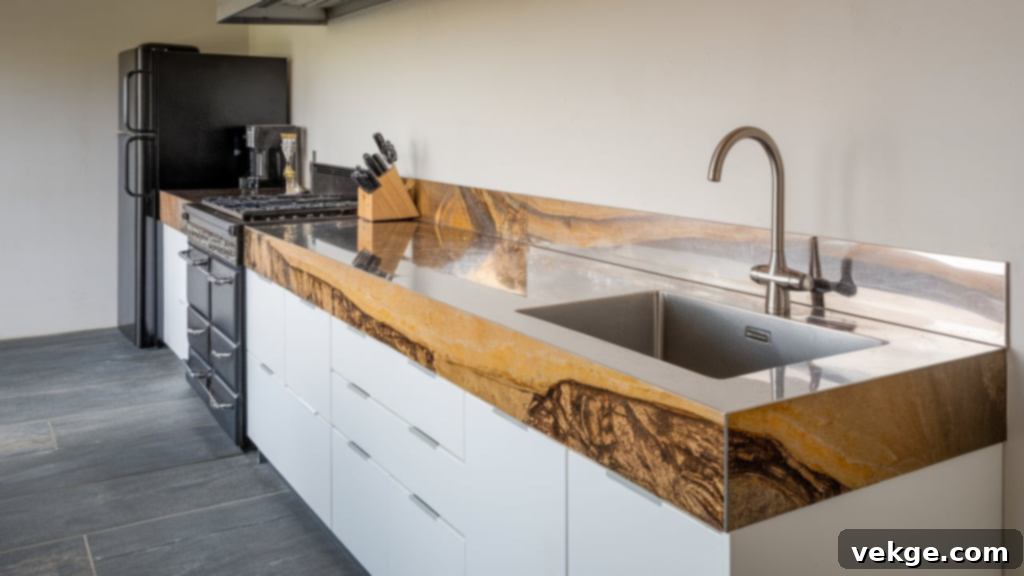
Polyester countertops, often categorized under solid surface materials, are another affordable option designed to emulate the look of natural stone or other premium surfaces without the associated cost. Made primarily from polyester resins and mineral fillers, they are non-porous, making them easy to clean and maintain, and resistant to bacteria growth. They are available in a diverse array of colors and patterns, providing ample design flexibility. While generally durable for everyday use, polyester is softer than acrylic solid surfaces or engineered quartz, making it more prone to scratches and less resistant to heat. Care must be taken with hot pots and sharp objects. Despite these limitations, their budget-friendly nature and ease of upkeep make them a practical choice for many homeowners seeking a good balance of cost and appearance.
17. Poured Epoxy

Poured epoxy countertops are a remarkably versatile and often DIY-friendly option that allows for unparalleled customization. This material consists of a two-part resin system that is poured directly over an existing countertop surface, curing to form a seamless, hard, and glossy finish. Epoxy can be tinted with various pigments, mixed with metallic powders, or embedded with glitter or other decorative elements to mimic the luxurious appearance of natural stone, marble, or even create entirely unique artistic effects. While offering excellent durability, heat resistance (to a point), and a non-porous, easy-to-clean surface, achieving a professional-grade finish requires skill and attention to detail to avoid bubbles or unevenness. Over time, some epoxies may yellow slightly, especially with prolonged UV exposure. Its customization potential makes it a favorite for creative homeowners looking for a unique and personal touch.
Pros and Cons of Different Countertop Materials at a Glance
To help you navigate your options more efficiently, here’s a quick comparison of the most common countertop materials, summarizing their key advantages and disadvantages. This table is designed to give you a clear, concise overview, making it easier to weigh what truly matters for your home renovation project.
| Material Category | Key Pros | Key Cons |
|---|---|---|
| Natural Stone (Granite, Marble, Soapstone, Quartzite) | Unmatched natural beauty, unique patterns, excellent durability (especially granite/quartzite), high heat resistance. | Can be expensive, requires periodic sealing (except soapstone), susceptible to etching/staining (especially marble), heavy. |
| Engineered Stones (Quartz, Concrete, Solid Surface/Corian) | High durability (quartz), low maintenance (quartz/solid surface), wide range of consistent colors/patterns, seamless options (solid surface), customizable (concrete). | Higher cost (quartz/concrete), can be heavy (concrete), not as heat resistant as natural stone (quartz/solid surface), concrete requires sealing & can crack, solid surface is softer. |
| Wood and Organic Materials (Butcher Block, Bamboo) | Adds warmth and natural character, eco-friendly (bamboo), can be cut on (butcher block). | Requires regular oiling/sealing, susceptible to scratches, water damage, and stains, not ideal for high heat. |
| Metal and Specialty Materials (Stainless Steel, Copper, Zinc, River Rock) | Unique aesthetic, highly durable (stainless steel), antimicrobial (copper/zinc), heat-resistant (stainless steel), custom design possibilities. | Often expensive, professional installation required, prone to scratches (copper/zinc), develops patina, can show fingerprints (stainless steel), River Rock requires sealing & maintenance. |
| Alternative Surface Options (Laminate, Paper Composite, Polyester, Poured Epoxy) | Most budget-friendly (laminate), wide variety of designs, easy to clean (laminate/polyester), eco-friendly (paper composite), highly customizable (epoxy). | Less durable than stone, prone to scratches/chips (laminate/polyester), not highly heat-resistant (laminate/polyester), limited availability (paper composite), professional finish difficult (epoxy). |
This comparative overview should simplify your decision process. The ideal material for your home will ultimately depend on a careful balance of your budget, maintenance preferences, desired aesthetic, and the functional demands of your space. Consider which attributes are non-negotiable and which you’re willing to compromise on to find your perfect match.
Sustainability and Environmental Impact of Countertop Choices
As environmental consciousness grows, many homeowners are increasingly prioritizing sustainability when selecting materials for their homes. The impact of countertop production and disposal can vary greatly, making it an important factor to consider in your decision-making process.
- Natural Stones: Materials like granite and marble are inherently natural and extremely durable, offering a long lifespan that reduces the need for frequent replacement. However, their extraction through quarrying can have a significant environmental footprint, including habitat disruption, energy consumption for transportation, and water usage. Many manufacturers are, however, adopting more responsible and sustainable mining practices, and choosing locally sourced stone can further reduce transportation emissions.
- Engineered Stones: Quartz and solid surface countertops combine natural stone particles with resins and other synthetic components. While some brands are making strides by incorporating recycled glass or other materials into their products, the synthetic binders (resins) still contribute to their environmental impact, as they are petroleum-based. The manufacturing process is also energy-intensive. However, their extreme durability and lack of need for harsh chemical sealants can be considered a positive in terms of long-term environmental footprint.
- Wood Options: Materials such as bamboo and reclaimed wood are generally considered highly sustainable choices. Bamboo is celebrated as a rapidly renewable and fast-growing resource that requires minimal water and no pesticides to cultivate. Reclaimed timber reduces waste by repurposing existing materials, minimizing the demand for new logging. When choosing wood, look for certifications like FSC (Forest Stewardship Council) to ensure the wood comes from responsibly managed forests.
- Affordable Options: Laminate countertops often use a composite wood core, which may come from sustainable sources. However, the plastic laminate surface itself and the adhesives used can be derived from petroleum, and some contain resins and chemicals that may off-gas or have environmental implications during production and disposal. Paper composite countertops, on the other hand, are often made from recycled paper and natural pigments, making them a more eco-friendly alternative within this category, though their production processes also involve resins.
- Metal Countertops: Stainless steel is highly recyclable, and many stainless steel products contain a significant percentage of recycled content, making it a sustainable choice. Copper and zinc are also metals that can be recycled. However, the energy required for their initial production and fabrication, especially for custom installations, can be substantial. The longevity of these materials, however, means they won’t need frequent replacement, contributing to a lower long-term impact.
Understanding these aspects can help you make a more informed and environmentally conscious decision, aligning your home’s aesthetic with your values.
Installation Considerations and Costs for Countertop Materials
Beyond the material cost itself, installation expenses are a significant part of your overall countertop budget. These costs vary widely based on the material’s weight, complexity of fabrication, and whether professional expertise is required. Here’s a breakdown of general installation tips and associated costs to help you plan your project:
For Stone Surfaces (Natural and Engineered Stones)
Materials like granite, marble, quartz, and quartzite are incredibly heavy and require precise measurements, professional cutting, and specialized tools for installation. Due to their weight and the intricate nature of achieving seamless seams and perfectly level surfaces, professional installation is almost always necessary and highly recommended. Trying to DIY these can lead to costly mistakes and potential injury. Installation costs for these premium materials typically range from $30 to $100 per square foot, depending on factors such as the specific stone chosen, the complexity of the kitchen layout (e.g., numerous cutouts for sinks or cooktops, intricate edge profiles), and your geographic location.
For Wood and Organic Materials
Butcher block and bamboo countertops are generally more forgiving to work with compared to stone. For skilled DIY enthusiasts, especially with pre-fabricated, straight-run options, self-installation is a viable possibility, potentially saving on labor costs. However, intricate cuts for sinks or unique shapes may still benefit from professional expertise to ensure a perfect finish and proper sealing. Professional installation for these wood-based materials typically falls within a range of $10 to $30 per square foot. This cost can fluctuate based on the type of wood, the complexity of the design, and the level of finishing (e.g., on-site oiling versus factory-finished).
For Non-Stone Alternative Options
Materials such as laminate and paper composite are among the most affordable options for both material and installation. Laminate, in particular, is widely known as a DIY-friendly material, with many homeowners successfully installing it themselves using basic tools. It comes in pre-formed sections or can be cut to size. Paper composite is also relatively lightweight and manageable. If professional installation is desired or required for more complex layouts, costs for these materials typically range from $10 to $30 per square foot, making them an excellent choice for budget-conscious renovations or quick updates.
For Metal and Specialty Materials
Stainless steel, copper, zinc, and river rock countertops often demand specialized fabrication and professional installation due to their unique properties and the custom nature of their application. Stainless steel, for instance, is often custom-welded to create seamless finishes, and river rock involves a skilled hand in embedding the stones. These materials are generally more expensive not only in material cost but also in installation expertise. The installation cost for these specialty materials can range significantly, from $70 to $200 per square foot, influenced by the material’s specific characteristics, the project’s complexity, and the level of customization involved. This higher cost reflects the specialized skills, tools, and time required for their precise and artistic installation.
Conclusion: Making the Right Countertop Choice for Your Home
Selecting the perfect countertop material is a cornerstone of any successful kitchen or bathroom renovation. As we’ve explored, the journey involves more than just picking a pretty color; it requires a thoughtful consideration of various factors to ensure your chosen surface not only looks fantastic but also performs optimally for your lifestyle. Remember to weigh your budget, the amount of maintenance you’re willing to commit to, your desired design aesthetic, and the durability required to withstand daily activities.
To effectively narrow down your myriad choices, begin by establishing a clear budget, as this will immediately help filter out materials that are outside your financial comfort zone. Next, visualize the overall style and ambiance you wish to create in your space; this will guide you toward materials that complement your design vision. Finally, be honest about the level of upkeep you’re prepared to handle. Are you someone who enjoys regular sealing and oiling, or do you prefer a wipe-and-go solution?
Don’t forget to factor in long-term considerations, such as the potential impact on your home’s resale value and how well each material is projected to hold up over many years of use. By taking a holistic approach, carefully balancing these practical and aesthetic considerations, you can ensure you make a decision that serves both your present needs and your future aspirations for your home. If you’re still feeling uncertain, don’t hesitate to gather samples, visit showrooms, and even consult with design professionals. Exploring other blogs and resources on home improvements can also provide additional insights to guide you further on your exciting renovation journey.
